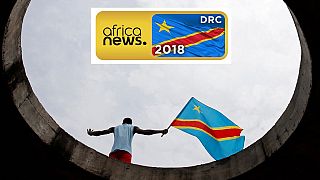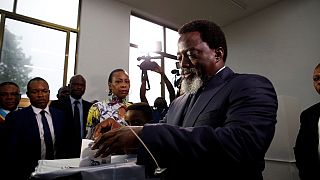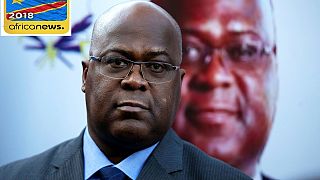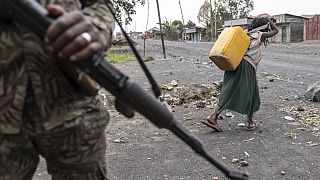Democratic Republic Of Congo
The competing claims followed a disorderly election day on Sunday in which many Congolese were unable to vote due to an Ebola outbreak, conflict and logistical problems.
The vote is meant to choose a successor to outgoing President Joseph Kabila after 18 years in power and could lead to the vast central African country’s first ever democratic transition.
Any disputed outcome could lead to a repeat of the violence that followed the 2006 and 2011 elections and a wider security breakdown, particularly along Congo’s borders with Rwanda, Uganda and Burundi, where dozens of armed militia are active.
Vital Kamerhe, the campaign manager to opposition candidate Felix Tshisekedi, said early counting showed Tshisekedi and the other main opposition candidate Martin Fayulu neck-and-neck in the lead, both with over 40 percent of the vote.
He said the ruling coalition candidate, Emmanuel Ramazani Shadary, who is backed by Kabila, had only about 13 percent, although a significant part of the vote remained to be tabulated.
The election is a first-past-the-post system with no run-off.
Nehemie Mwilanya, Kabila’s chief of staff and a member of Shadary’s campaign, told a news conference on Monday morning that he was confident Shadary had won, although he did not provide specific figures.
“For us, victory is certain,” Mwilanya said.
Fayulu’s camp has not yet provided specific numbers but Fayulu said late on Sunday that Shadary’s camp was “dreaming” if it thought it was going to win.
The most recent opinion poll before the election, released by New York University’s Congo Research Group on Friday, showed Fayulu, a former Exxon Mobil manager, leading the race on 47 percent.
Tshisekedi had 24 percent and Shadary 19 percent.
The first partial results are expected from the national electoral commission (CENI) on Tuesday.
Election day was mostly peaceful despite several violent incidents, including an altercation at a polling place in eastern Congo in which at least three people were killed.
More than 1.2 million Congolese were also unable to vote in three opposition strongholds, where the CENI cancelled the poll last week, citing an ongoing Ebola outbreak and ethnic violence.
However, in the Ebola hotspot of Beni, an opposition stronghold, residents staged a mock presidential election to show the authorities a decision to postpone the vote there due to health fears was unfounded.
REUTERS













Go to video
Joseph Kabila’s return: Political comeback or threat to national unity?
Go to video
Kinshasa reacts to Trump's claim that 'many' Congolese come to US
Go to video
Congo suspends Kabila's political party over rebel 'ties'
Go to video
Goma reacts to return of Kabila from exile
Go to video
Somalia launches national voter registration campaign
00:57
Gabon: Oligui Nguema clinches a landslide win